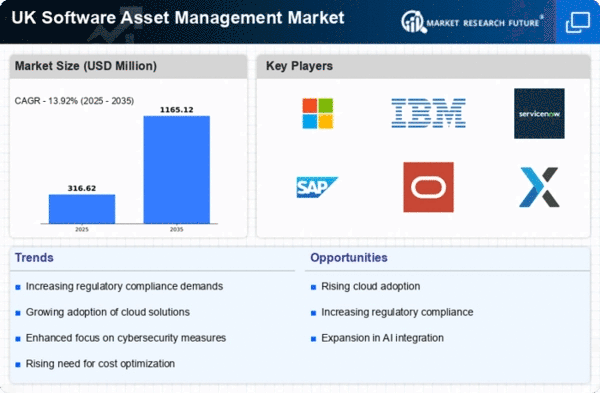Regulatory Compliance Pressures
In the UK, the software asset-management market is significantly influenced by increasing regulatory compliance pressures. Organisations are required to adhere to various legal and industry standards, which necessitates a comprehensive approach to managing software assets. Failure to comply with these regulations can result in substantial fines and reputational damage. As a result, businesses are investing in software asset-management solutions that facilitate compliance tracking and reporting. The market for compliance-related software is projected to grow by approximately 15% annually, reflecting the urgency with which companies are addressing these challenges. This trend underscores the critical role of software asset management in ensuring that organisations remain compliant while optimising their software usage, thereby driving growth in the software asset-management market.
Increased Focus on Cybersecurity
The software asset-management market is increasingly influenced by the heightened focus on cybersecurity among UK organisations. As cyber threats become more sophisticated, businesses are recognising the importance of securing their software assets to protect sensitive data and maintain operational integrity. Effective software asset management plays a crucial role in identifying vulnerabilities and ensuring that software is up-to-date with the latest security patches. Companies are investing in software asset-management solutions that incorporate cybersecurity features, which is expected to drive growth in the market. The demand for integrated solutions that address both asset management and cybersecurity is likely to increase, reflecting the evolving landscape of IT security. This trend suggests that the software asset-management market will continue to expand as organisations prioritise the protection of their software assets.
Rising Demand for Cost Efficiency
the software asset-management market is experiencing a notable surge in demand for cost efficiency among organizations in the UK. As businesses strive to optimise their IT budgets, the need for effective software asset management becomes increasingly critical. Companies are seeking solutions that can help them identify underutilised software licenses and eliminate unnecessary expenditures. According to recent data, organisations that implement robust software asset-management practices can save up to 30% on their software costs. This trend indicates a growing recognition of the importance of managing software assets effectively, as firms aim to maximise their return on investment while minimising waste. Consequently, the software asset-management market is likely to expand as more businesses prioritise cost-saving measures and seek to enhance their financial performance through strategic asset management.
Shift Towards Remote Work Solutions
The software asset-management market is adapting to the shift towards remote work solutions, which has become increasingly prevalent in the UK. As organisations embrace flexible working arrangements, the demand for software that supports remote collaboration and productivity has surged. This shift necessitates effective management of software assets to ensure that employees have access to the necessary tools while maintaining compliance with licensing agreements. Companies are investing in software asset-management solutions that provide visibility into software usage across remote teams. This trend is expected to drive growth in the market, as organisations seek to streamline their software management processes and enhance employee productivity. The software asset-management market is likely to see an increase in demand for tools that facilitate remote work, reflecting the changing landscape of the workplace.
Emergence of Subscription-Based Models
the software asset-management market is witnessing a significant shift towards subscription-based models, increasingly popular among UK businesses. This transition from traditional licensing to subscription services allows organisations to access software on a pay-as-you-go basis, providing greater flexibility and scalability. However, this model also presents challenges in terms of managing software assets effectively. Companies must ensure that they are not overspending on subscriptions or failing to utilise the software they have subscribed to. As a result, there is a growing need for software asset-management solutions that can help organisations track and optimise their subscription usage. This trend indicates a potential growth area for the software asset-management market, as businesses seek to navigate the complexities of subscription management while maximising their software investments.
















